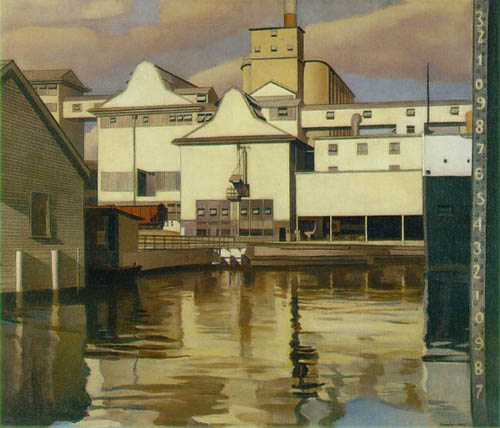H e a r t S o n s & H e a r t D a u g h t e r s of
A l l e n G i n s b e r g
N a p a l m H e a l t h S p a : R e p o r t 2 0 1 4 : A r c h i
v e s E d i t i o n
DAVID COPE
River
Rouge
after Charles Sheeler’s painting

Charles Sheeler, River Rouge Plant, 1932. Oil on canvas,
20 × 24 1/8 in. (50.8 × 61.3 cm).
Whitney Museum of
American Art, New York.
Faces
in Shadow
toxic clouds roil & pass above—
specks land
in the unseen housewife’s
fluttering washlines,
in the nostrils of the workers—
here, the machine itself, “functional
architecture” half-distorted barns,
half featureless rectangles—
the river, reflecting this
ochre & brown geometry,
the treeless land—
yet nowhere
in this landscape do we see
the armies of workers marching
thru the doors at dawn,
chatter & coffee & taking in
the enveloping roar of the machines,
leviathan
eating them alive, the
mad labor of the assembly line, the men
sweating, pulling, turning,
teasing out parts and forms
forcing out Ford’s cars
robotic in
dizzying line, ears
gone deaf in the noise,
bosses above
counting down every movement,
measuring time,
measuring the men themselves to see what more
they could squeeze
from blood & bone.
Beyond
the shadow
My dad grew up in the D,
his dad a mechanical engineer
redesigning high speed
pipe turns at Con Ed,
his childhood neighborhood
raising three to be trans-
national corporate officers—
by day a wild flight of kids
jumping off roofs, racing
thru back alleys—by night,
families cowering in basements
as Feds & the Purple Gang
shot it out a block away.
he’d dream back dancing
whole groups of friends
swinging at the Grande to
the Duke & Goodman,
& there
was the
“Battle
of the Overpass,”
where Ford’s goons battered
Walter Reuther until
his skull bled, the workers
“sticking to the union
‘til the day they’d die”—
& as a young
married man
he’d lock my mother in
braving machine guns
at intersections to get
to his job working on
bell housings of Sherman tanks
during the race riots of
’43—Hitler still rampant,
first islands pacific at last.
The
Scythe of Time
My grandma died at Eloise Asylum
now a phantom ruin—still standing,
empty halls, paint peeling,
a fading stone in the cemetery.
I was born at Women’s Hospital
& saw Ted
Williams hit one into
the center field upper deck at
Briggs, Kaline hitless that day.
Later Janis Joplin played the Grande,
the Stones drove ‘em
crazy at Olympia—
Motown rose with muscle cars
on the Reuther, the riots of ’67—then
burned out years & neighborhoods,
ruined homes & blocks, the Rouge itself
become a relic of another time—
ghost world of shades chewed up
in the scythe, Time itself become
a tale buried in the lost villages
of Anishnabek
& voyageurs
filled with the light of the forest,
who fell in love with this
land of waters.
& I come back & dream my
grandfather
toiling in his garden, my dad a boy
again, his dream of the D & those men
who sang these streets & turned
lathes & worked the lines, hopeful.
["River Rouge" first appeared in Big Scream 52, Big Hammer 16, and The Wayne
Literary Review. Used by permission of
the author.
Originally published
in NHS 2013, http://www.poetspath.com/napalm/_special_edition_nhs_2013/.]